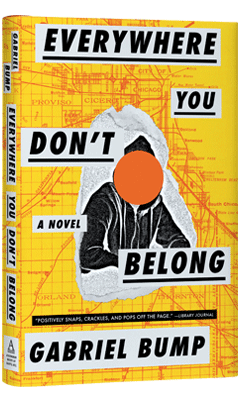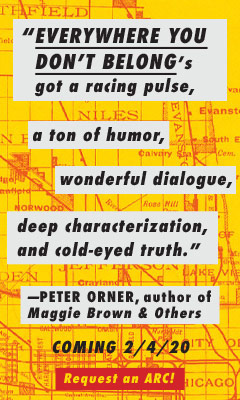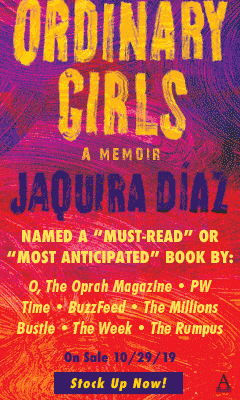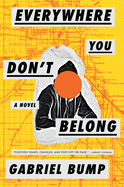Everywhere You Don't Belong
by Gabriel Bump
Gabriel Bump's debut, Everywhere You Don't Belong, is an excellent coming-of-age novel that will make you laugh when you least expect it. Growing up on the South Side of Chicago, Claude lives with his Grandma and her friend Paul--their relationship is close but difficult to define--after being abandoned by his parents. Much of Claude's childhood is characterized by friends and family leaving him behind, including a gifted basketball player named Jonah whose talents are regarded as semi-divine by Paul and the Chicago Bulls-worshipping community. At a shockingly young age, Claude finds himself reflecting on all the people that loved and left him: "All those far away people sat inside me, waved, wished me well. Most nights, outside my bedroom window, all that love felt far away, impossible to see and feel." The narrative has an episodic feel, with two questions always in the background: Can Claude leave the South Side? Should he?
Grandma is a force of nature with a talent for understated quips. The novel opens with Claude's memory of his father wrestling another man on the street, determined to make the man apologize for saying that he looks like Booker T. Washington. The encounter ends after Grandma declares: "That's it.... Enough culture for one day." Much of the humor in the book comes from these outlandish yet sympathetic characters. Bump has a talent for writing scenes with a combination of absurdity and pathos. When Paul attempts to get revenge on the man who beat him up and took his lover, first with a staff that he bought at a garage sale--"The woman said it was African and ancient"--and then with a pair of nunchaku, his attempts at bravado are amusing and pitiful at the same time. When Claude tries to calm him, Paul responds: "There are no small injustices in this world." It's both ridiculous and possibly correct.
Claude plays the straight man in many of these encounters, a low-key boy and then a man who finds himself thrust repeatedly into the midst of violence. He is beaten viciously by a basketball player, attacked by the coach when he refuses to lie about who did it, and later forced into a kind of impromptu fight club. His defensive strategy in the latter is hilarious: "I started screaming. So I was running around, kicking his shins, trying to punch his balls, and screaming as loud as I could. I might've looked like I was winning." The humor and the terror of these scenes are always closely interwoven. The way that violence finds Claude is so unpredictable and inevitable that it seems there's little chance of him finding a way to avoid it.
In a crucial episode, violence seems to hit the whole neighborhood like a hurricane. The crisis is prompted by a police killing reminiscent of what happened to Eric Garner and so many more black teens and men: "So long story short, the cops catch the kid and sit on him because the kid won't cooperate. They sit on him so the kid can't run away. But they end up suffocating him. They were choking him too, I think." A riot ensues, sparked by the killing and a confrontation between police and a gang called the Redbelters. Amid the chaos, Claude seems paralyzed by his lack of choices. Or, as he puts it: "There was no available peace. Throughout high school, my history teachers wouldn't explain what happens when there's no available peace." Everywhere You Don't Belong is set in the recent past, but there's no doubt that it is in dialogue with the present. When Bump writes about then-Senator Obama vowing to take legislation to Washington in response to the riot, it's difficult not to think about how little has changed in the time since.
In spite of his history with abandonment, Claude has a tendency to put his faith in people, and so it makes sense that when he falls in love with a schoolmate, Janice, he stays in love, even after Janice suffers a tragedy at the riot that seems to push them apart. When Claude finally leaves Chicago for the University of Missouri, he finds himself missing her and his hometown. At the university, readers are treated to an entertaining parody of college life and the student newspaper that Claude works for, the Prairie Executioner. Here, people seem to be operating in a different universe from Claude, such as his roommate Kenneth, whose arcane obsessions make him more suited for a world of "beanbag mountains and lava-lamp rivers," and Connie Stove, a legendary journalist who gives lengthy, off-the-wall speeches: "Acid turned our minds into glorious sponges. We turned the pizza boxes into dioramas of public monuments. We made a pizza-box Lincoln Memorial and stomped on it until the greased cardboard turned to mush." Meanwhile, Claude is being pushed to "translate the black experience" at the newspaper. It's no wonder he finds himself alienated and homesick for the very place he worked so hard to escape.
At every point in Claude's life, he finds himself torn in different directions. His choices all come with compromises, if he has any good options at all. Everywhere he turns, there is no available peace. Bump has written a sprawling novel, despite the short length, with sharp bursts of wit that never undermine Claude's predicament. Everywhere You Don't Belong is a book about the tragic absurdity of growing up in a place that you both love and need to leave. --Hank Stephenson








_Jeremy_Handrup.jpg)